When will the New Synology 2020 Diskstation NAS Be Released?
For those of you that are considering buying a brand new Synology NAS at the end of 2019, you will be understandably surprised by the unusual lack of new Synology Diskstation (Desktop) DSx20 NAS solutions that have been released. Synology has always been a company that, despite their ever-growing range of solutions, has always had a fairly regular release schedule across its range of devices. With typical J and standard series devices arriving around 12-18months apart, Plus (+) series models arriving at around 2 years apart and bigger SMB/Business solutions arriving around 2-3years apart. However, here in the closing stages of 2019, we have seen very, very few new releases and this has lead alot of buyers to take pause. As good as the likes fo the Synology DS218+, DS918+ and DS718+ NAS are, they are now over 2 years old and this has lead to a number of buyers to hold on till something new comes along. But with no formal reveal made and the likes of Black Friday, Seasonal Sales and people wanting to spend a little something on a new gadget, a good % of these buyers are looking at other brand sto see what is on offer. It is an odd time for NAS buyers (new and old) and therefore I thought it would be prudent to take a good look at everything we know about the new range and maybe figure out if it’s worth waiting, buying the current-gen or seeing what else is out there for 2019/2020.
APRIL UPDATE 2 – Click Below – Synology DS920+, DS220+, DS720+ and DS420+ NAS – HUGE INFORMATION DROP
APRIL 2020 Update – Click Below to learn about an information Update we have on the DS220+, DS720+, DS420+ and DS920+
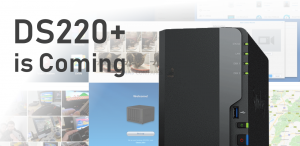 |
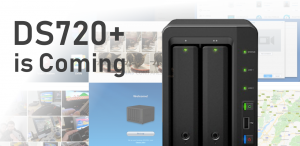 |
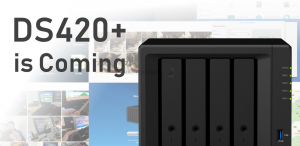 |
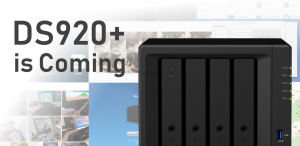 |
Further Information on the latest Hardware/Software releases from Synology can be found here – https://nascompares.com/2020/03/19/synology-2020-2021-everything-we-know-so-far/
Why Have the Synology DS220+, DS920+, DS720+ and DS420play NAS not been Released?
Much like everyone else, I like to stay on top of what’s new in the world of NAS (both professionally and personally) and have received numerous messages about the subject of NAS, from other users, connected brands and from Synology themselves. However, with a sea of mixed messages afoot and numerous explanations levelled about why the newer DS220+ or DS920+ is still yet to be revealed, I think it is best we go through them one by one below, as any of these could be the potential reason for a delay in release.
Reason 1 – The Existing 2018/2019 Synology NAS series is sufficient
Although the majority of the Synology DSx18+ and DSx18 series were revealed and released all the way back in Autumn/Winter 2017, it really was a huge shake-up for Synology Hardware. Up until that point we had seen ALOT of the same CPUs in use and hardware that was noticeable compared to older generations. However that all changed with the x18 series and set the tone for Synology to be a brand that was able to trade on both software AND hardware, with its rivals. Such big jumps as the 4K transcoding and 2GB Memory of the DS218+, the NVMe SSD support of the DS918+ and the 64bit ARM CPU’s and DDR 4 memory being used in the J and standard series made the DSx18 series a massive jump over older generations. So, although they are in some cases now over 2 years old, it is worth highlighting that the majority of them run DSM 6.2 exceptionally well. So, it could be argued that the need for a newer generation is far less so this time and in efforts to improve the DSM platform, they have invested those savings in the upcoming DSM 7.0 release. I know for some this will be a weak argument for some and will make them sit on the fence a little longer. But with the DS918+ NAS still doing outstanding well (psst, it’s still in a few of my Best of the Year picks next month), there is a fairly good argument for this if it was true.
Reason 2 – The New Intel J4005, J4105 and J4115 CPU are in short supply
One detail that keeps getting mentioned at tradeshows and events is the fact taht the newer generation will likely feature the Intel J4000 series. This newer generation of powerful yet efficient Celeron processor has already been featured in a few solutions from other brands and alongside serving as a great step up from the popular J3455/J3355 processor in the x18 series, it also has added benefits towards 4K improvements and graphical support. However, alongside this news, there have been grumbles about the availability of this processor being less than ideal at the point of manufacture and this would not be the first time that a lack of stock of a CPU from the Intel factories would result in issues with a NAS (see DS716+ and DS216+, becoming DS716+II and DS216+II with a different CPU). This is certainly a rumour I have heard, alongside the squashed one surrounding the J3000 series (now defunct), but it is worth keeping an eye on.
Reason 3 – To Coincide with the Release with Synology DSM 7.0
With the world reveal of DSM 7.0 back in the summer and the continued promotion of the new GUI and system software in their worldwide launch events, the Synology Diskstaion Manager version 7 is a big, big deal to both the companies and the users. It serves as a big move for the system software from DSM 6.2 and everything from tweaking it, to compatibility and usability design takes ALOT of time. We fully expect a beta version to be made available closer to official release (Feb 2020), but even before this reaches public access, it will still need to be completely tested on platforms, old and new. Given that DSM 7.0 was first revealed back in Autumn 2018, this is certainly one of the longest build and testing sessions on their software history by my reckoning and this could also play it’s part in the release of a newer generation. Although this is the least speculated reason for the lack of DS220+ and DS920+ right now, it still serves as a potential nevertheless.
Reason 4 – Re-equipping the range with 2.5/5Gbe Connectivity
Another good thing about the newer J4005, J4105 and J4115 Celeron CPU that we have reason to believe will be featured in the newer 2020 series of Synology, is that this processor can handle multi-gigabit connections on its ethernet adapter. This opens the door for the newer Synology DS920+ or DS720+ to feature 2.5Gbe or 5Gbe connectivity. Although there was a time that I never thought Synology would consider connections like these on their hardware (even 10Gbe connectivity they have kept at arm’s length, favouring PCIe options or almost full rackmount exclusivity for the connection), their newer DS1620xs NAS that was revealed in Taiwan for later next year features 4x 2.5Gbe. Given that multi-gigabit ports are fast becoming standard (with a manufacturer price point for 2.5Gbe VERY close to 1Gbe right now), as well as modern routers and mobile devices arriving with super-fast, beyond gigabit WiFi 6 (802.11ax) support, the need for a more capable ethernet connection is growing all the time and this could easily make the product managers and techies at Synology want to head back to the drawing board. This is the least likely reason on my list and, even if true, would likely only touch on the DS920+ NAS, but we will see.
Reason 5 – Changes to the Synology Hardware vs Software Business Release Schedule
In recent years we have commented on the fact that when it comes to the Synology hardware release schedule, we seem to see a turn by turn pattern of Business Units, then Home/Prosumer units, then back to the business. If you take a look at the release of Rackstation VS Diskstation devices, you will see that the announcement and eventual release of these devices have always seemed to be with each tye largely in its own part of the year. However, this formula has gradually changed in 2019 to a point where the business hardware has been far more prominent in the year and what few Diskstation NAS that we have seen in 2019 have been tweaks on the existing range, or whole new hardware (see the DVA3219, UC3200, RS1619xs+ and MR2200ac). Though this is still a very positive thing for the Synology NAS brand, as well as resulting in some fantastically innovative hardware being created – GPU powered NAS and Active-Active NAS servers – it is still very one-sided at the moment and could likely mean that the Synology NAS brand is trying to re-invent the way it releases it’s featured ranges in Diskstation – spacing them out and shifting the focus on business users through the year.
Reason 6 – Brexit, Trading Difficulties, National Issues and its effects on the Supply Chain
A far, far more ambiguous reason for the slow release of the newer generation of Synology NAS could simply be that the world is in a remarkably volatile state for consumers and manufacturers alike. With large scale politic events, national decisions that affect the supply chain and tax, as well as social issues between numerous nations that have resulted in sour national relationships in 2019 – this has no doubt made life for a tech brand exceptionally difficult to predict and the gain/loss of an ill-timed release could be exceptionally damaging. I think it would be naive to imagine this has no impact.
Which Synology 2020 NAS Have been Released?
Although the main Synology NAS units that people are waiting for have yet to confirmed (the previously mentioned DS220+, DS920+, DS720+, DS220play, DS420play and DS120), there are still a large fair number of Synology 2020 Hardware releases currently available. Below are the currently released (or very imminent releases) that you can buy right now in the Synology DSx20+ Range:
The Synology DS620slim NAS
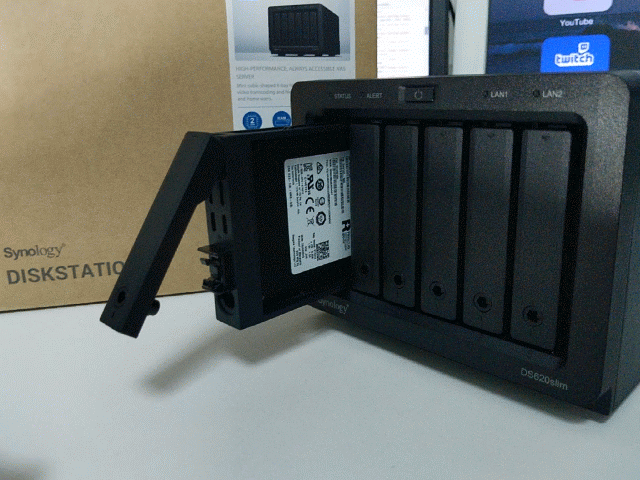
The Synology DS620slim is a network device that is hard to compare with the majority of NAS drives in 2019. Many of us are well aware of the advantages to home and business users of a robust and reliable network-attached storage drive. However, much like any tool or technology that that exists for a long time, variations of existing hardware that are designed to suit different users begin to emerge. The Synology slim series is a classic example of physical design being the most important part of the product itself. The DS620slim, much like previous Synology slim devices, is a NAS server that aims to give you all the features and functionality of a modern NAS, but in a remarkably compact form. With the DS620slim being released only weeks after the other less powerful slim model, the DS419slim, yet arriving twice as expensive, is there room in such a niche industry as NAS for Synology to release two slim units with the more conscientious user in mind? ultimately, does the Synology DS620slim NAS deserve your data?
 |
The Synology RS820+ NAS

Information on the new Synology RackStation NAS servers for release later in the year continues with the new RS820+ and redundant power enabled RS820RP+. Keen followers of NAS (guilty!) will see a few similarities to it’s predecessor (the RS818+) and this is understandable. Synology has several key product families and the expandable 4-Bay mid-range rackstation series is an oldie, but a goodie. This new 1U 4-bay rackmount NAS is designed for small and medium-sized businesses. Powered by a quad-core processor with an AES-NI hardware encryption engine, the Synology RS820+ and RS820RP+ provide both high performance and scalable storage space, an ideal centralized data backup solution, a means to protect critical data assets, and sharing files across different platforms and operating systems without delay
 |
The Synology RS1220+ NAS

As ever, I am sorry to be so ‘basic’, but despite the award-winning software that is included with the Synology DSM software (currently in 6.2 and 7.0 always on the horizon), the hardware will give you some idea of both what the RS1220+ NAS can do and to what extent it can do it! This can be for several reasons. It can be because Synology do not want their software poorly represented by hardware that will not run their proprietary software fluidly (the DS119j is a good example, with it’s streamlined version of DSM 6.2) or that the hardware inside just does not have the architecture to support the software in question (Plex and ARM 64bit CPU were till recently, incompatible). This is why I always have to give a little focus to what we know about the hardware so far and the RS1220+ Synology NAS is no exception. Plus I think it would be remiss of me not to highlight that a number of users have their reservations about this CPU. I think it performs remarkably well and Synology have spent a great deal of time getting alot of performance from it in DSM 6.2/7.0 for their users (thereby keeping its hardware at an affordable and attractive level), but some would prefer a beefier Intel Pentium or higher at least.
 |
The Synology DS120J NAS
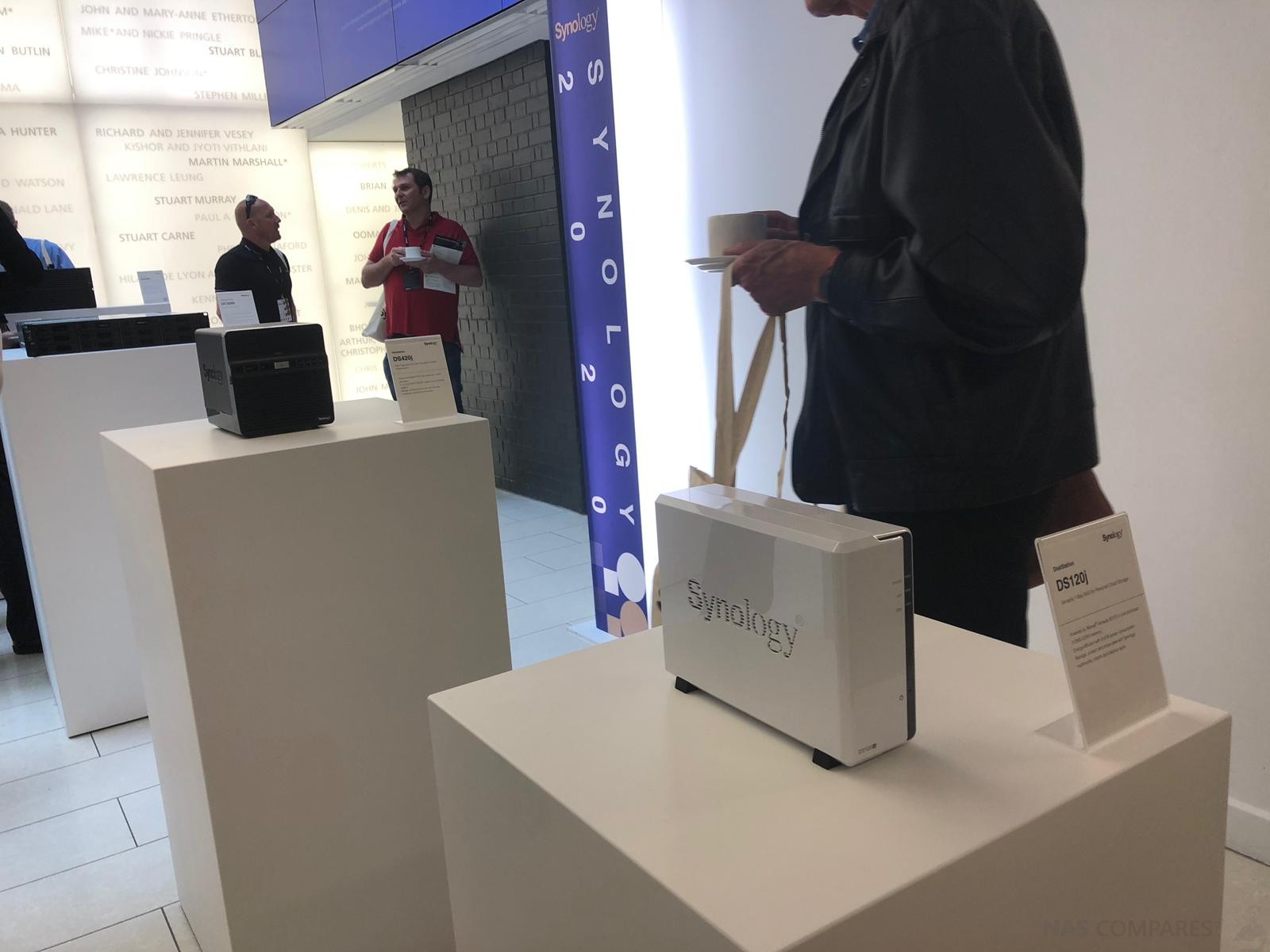
Although we always make efforts to highlight that Synology is a brand that you invest in for ‘DSM – Diskstation Manager’, there is no denying that the specifications featured inside the DS120j are quick modest compared with the majority of Synology NAS server devices. This is made in efforts to make this device as affordable as possible (likely arriving at under £100, not including tax of a hard drive), but this does not mean it is going to run DSM poorly. We have seen numerous NAS devices in the last 2 years from Synology in their J and older SLIM series that seemed to throw out the rulebook, giving us a NAS solution that featured 32-bit ARM specifications, yet after initial setup, seemingly ran DSM remarkably well! Below is the hardware specifications that we can confirm (or at the very least surmise) about this new NAS drive:
 |
The Synology DS420J NAS
As the new DS420j uses the same rear-access chassis design as it’s predecessor, we already know quite a few things about it’s design. This mostly metal casing looks very different from the rest of the designs in the Diskstation series, with no support for hot-swapping, memory upgrades or NIC upgrades, this is a NAS that arrives at a low price point sure, but also arrives with a glass ceiling. That said, the specifications are very similar to those of the DS418 and DS218play (with differences in RAM quantities). This 4 Bay NAS also arrives with the standard ports you would expect, but nothing that will blow your socks off.
 |
Synology UC3200 Rackmount NAS
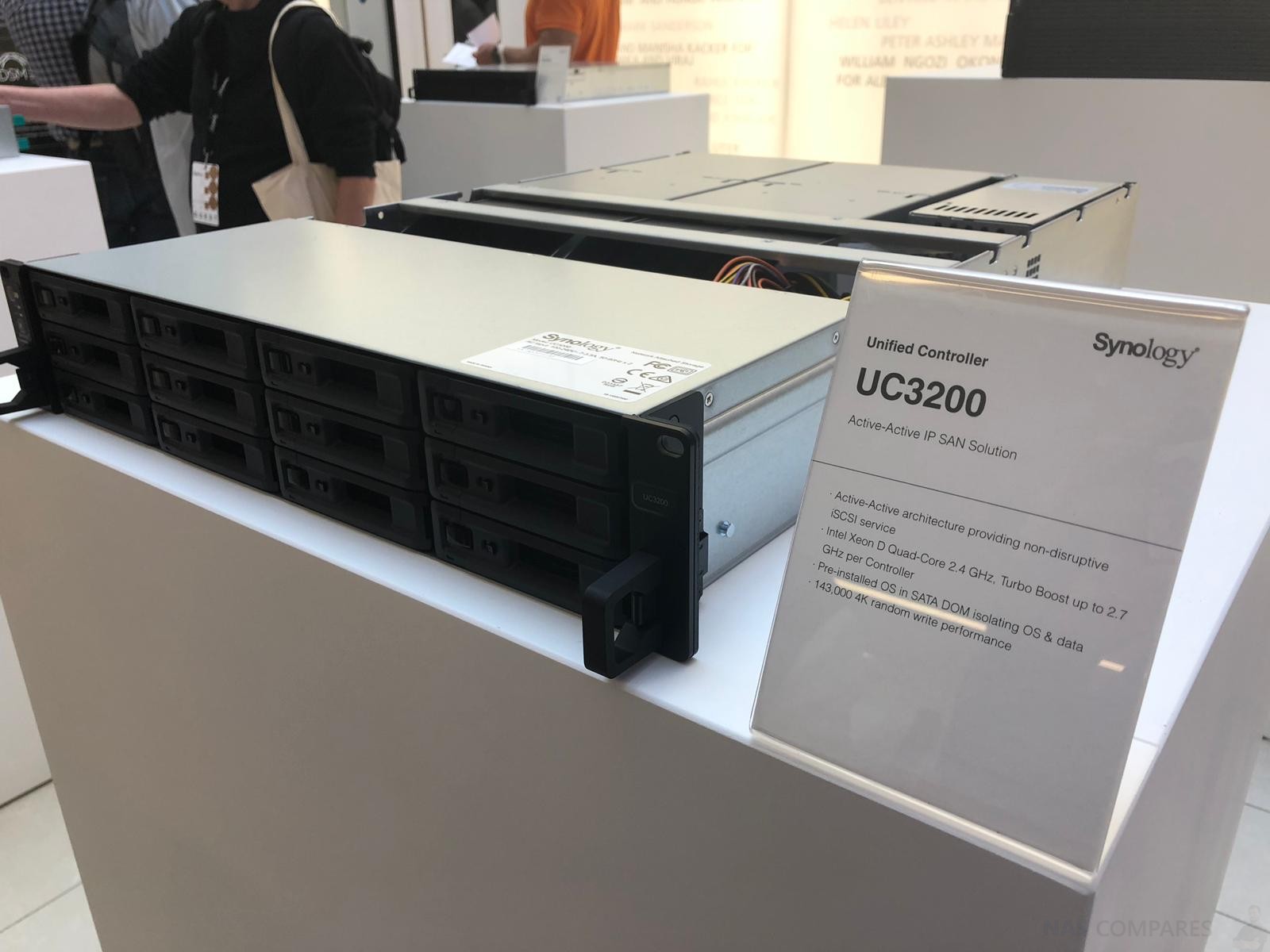
If you are a business owner, enterprise file hosting platform, surveillance NVR user or just generally someone whose infrastructure cannot withstand even minor disconnection (even down to the minute), then the UC3200 Rackstation NAS from Synology (First revealed late last year as the UC300) is definitely device that has alot that appeals you. As we have already established previously here on NASCompares, Synology has been making bigger and bigger moves into the enterprise sector for a while now. The brand that has spent more than 15 years making network attached storage hardware, featuring the popular Diskstation Manager software, with their first Rackmount NAS server back in 2006 (RS-406), have now fully uncovered potentially their most powerful and advanced Rackmount NAS yet for later in 2019. Featuring a unit dual-active controller (dubbed Active-Active) design and 12 Bays of storage, this unified controller system promises the ability to have a combination of redundant RAID storage and (better yet) WHOLE system redundancy. Alongside this, we see the already long established business class hardware, power, speed and support that is already available in the XS series, but even more so! With it’s dual CPU architecture that STILL manages to let users use BOTH processors, yet still gives you a dual controller architecture, this is a really big game changer! let’s take a closer look at this beast!
 |
The Synology DVA3219 GPU NAS
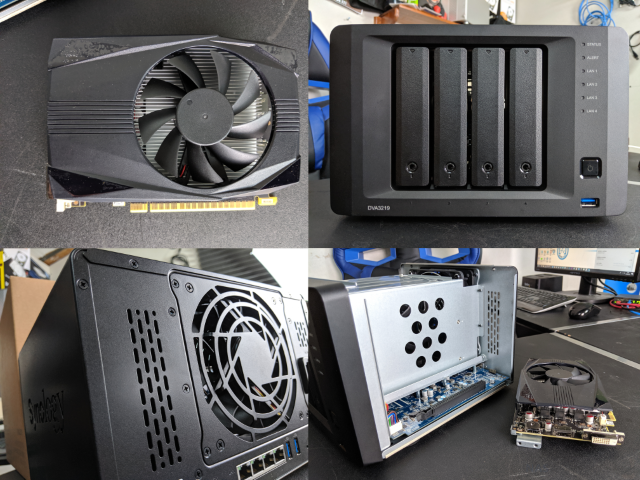
One of the most popular and continuously evolving ways that users want a NAS drive is for home and business surveillance. Whether it is the security of family or for much more enterprise requirements, CCTV and surveillance solutions are very much the vogue right now in the NAS server industry. A competent and fully-featured NVR solution is not a cheap thing and although fantastic surveillance software is available on even lower-tier budget NAS solutions, but if you want to get set some serious NAS based surveillance in place, then these are going to cost you a little more. Synology currently has one of the best surveillance software applications available in the market today and it arrives bundled with an included camera licences with every single NAS drive they sell. Performance on different NAS drives vary and despite continued research and development on the surveillance station software, there comes a point when the biggest jumps in the software require the biggest jumps in hardware to support them. The brand new DVA3219 NVR NAS is a solution that completely increases the potential of this software and introduces artificial intelligence into the equation for real-time deep video analytics. In real terms, it means that in a multitude of different ways your surveillance footage is analysed at the point of recording and in real-time, to denote potential security threats and/or eliminate false alerts.
 |
Which Synology 2020 NAS Drives have been confirmed?
Alongside the currently available Synology 2020 series that have been released (or soon to be), there are also several pieces of Synology hardware that we can confirm WILL be released in 2020, from numerous official events and we recommend you check them out. Although these are all rather enterprise options, it is worth taking a look to see the way the company is going and also to see that they have really, REALLY been looking into the hardware side of things with a great more flare for 2020.
The Synology Active-Passive SA3200D Rackmount NAS
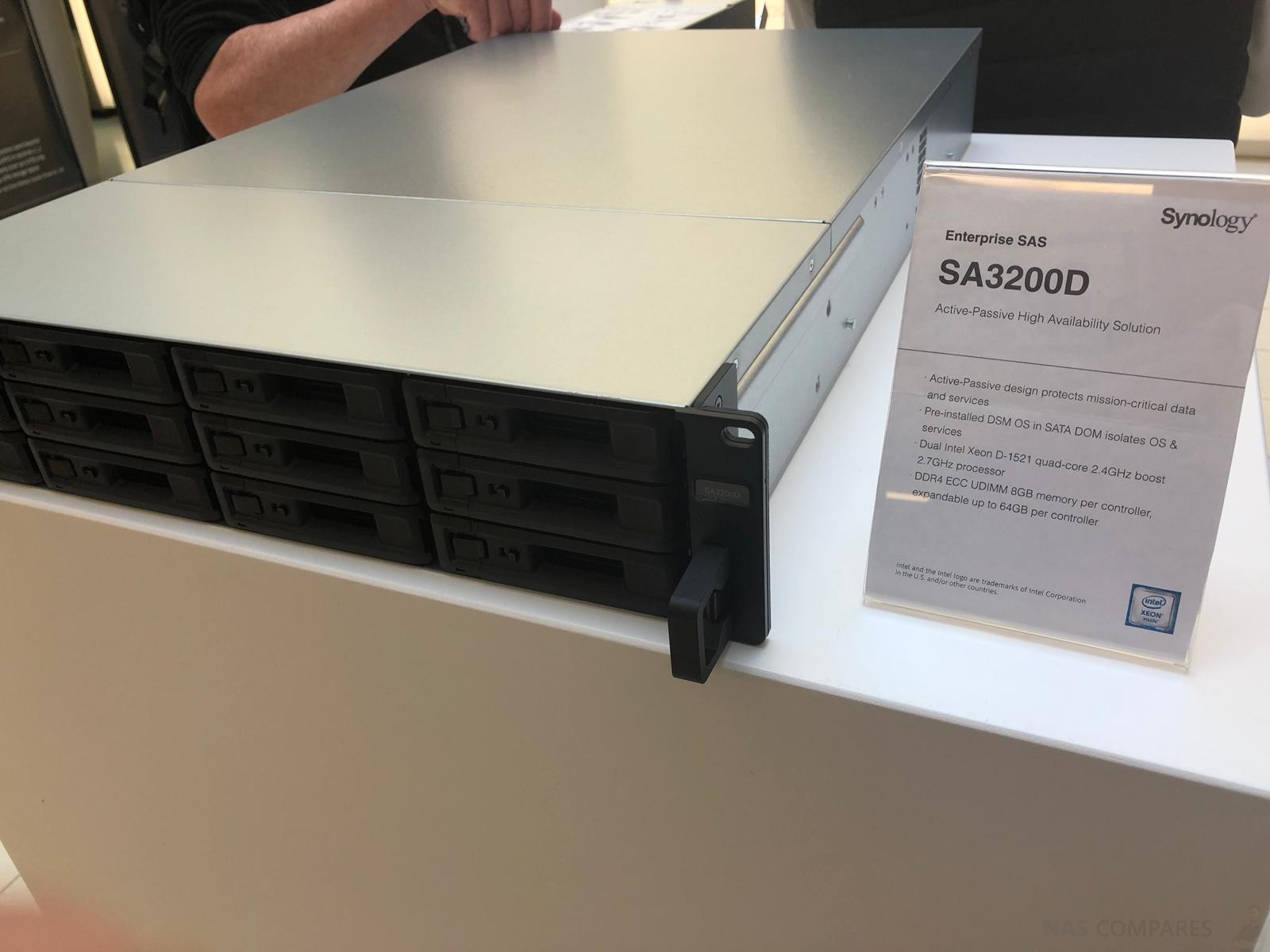
The hardware found in the Synology SA3200D is up there with some of the most powerful we have ever seen from them in the entire RackStation range. Featuring two of everything (as you would expect from the Active-Passive controller setup), 10Gbe, Redundant PSUs and huge memory and storage expandability, the hardware specifications of the SA3200D are pretty mind-blowing. Take a look:
The Synology HD6400 60-Bay NAS
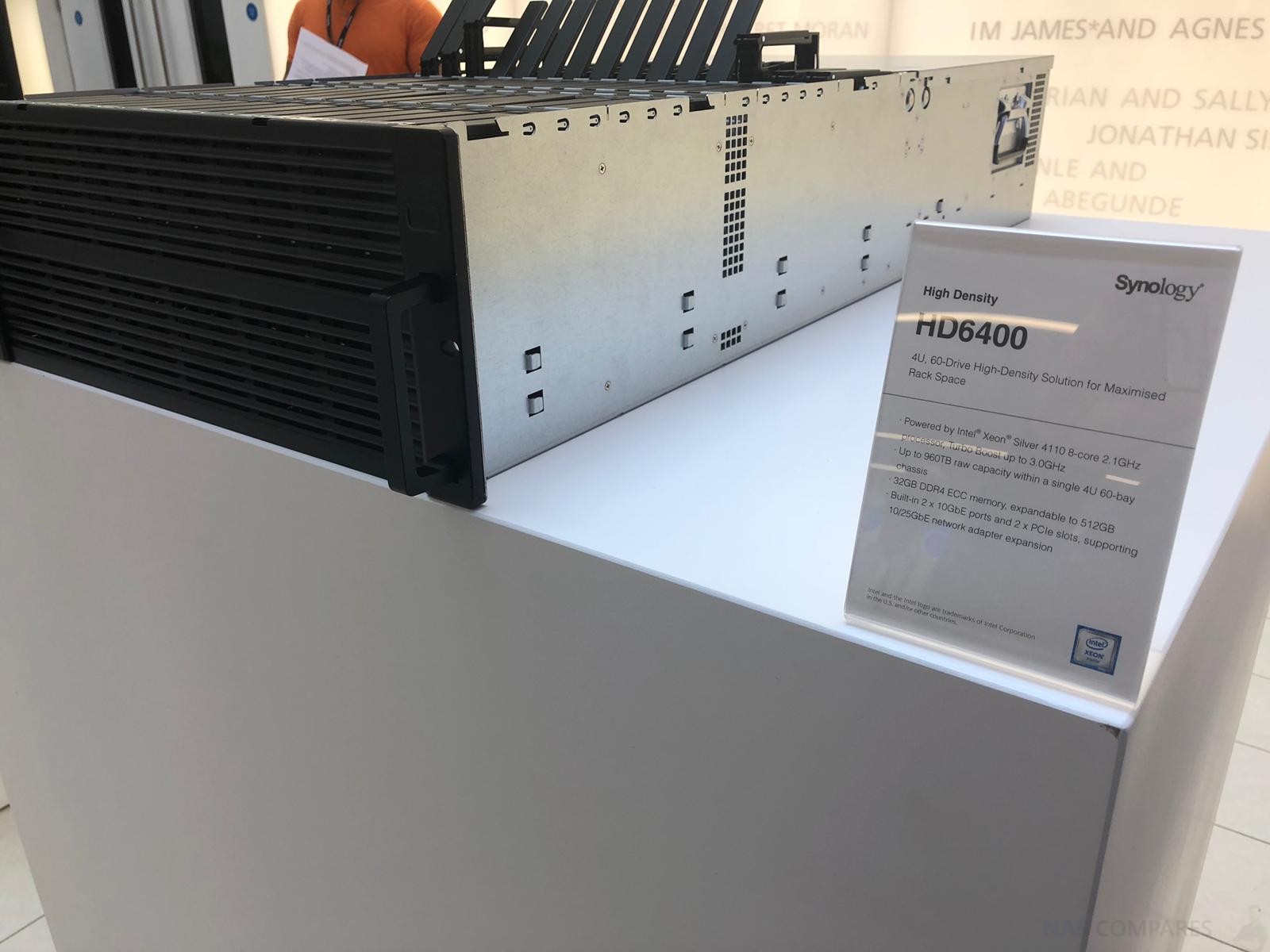
As you might well expect, in order to support that insane 60 Bays of storage (that no doubt support the latest 16TB Seagate Ironwolf NAS Hard Drives and Ironwolf 110 4TB SSDs) this device is going to need a seriously powerful architecture surrounding it. Obviously, from a build stance, this rackmount will be beefy. Synology’s rackmount range is already well established enough, that I have little or no concerns about the build quality externally. But with a new kind of drive injection and deployment system in place, along with a much more enterprise-level processor architecture in place, I am keen to look under the bonnet on this.
The 10Gbe+NVMe PCIe Card
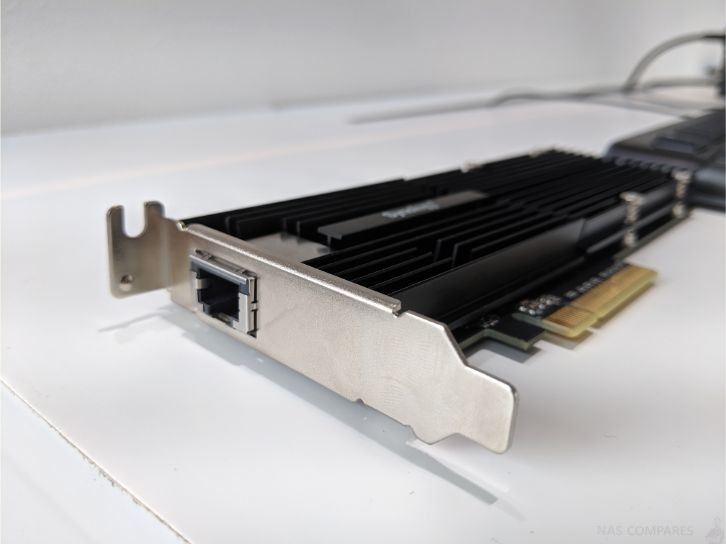
Good news for those looking to find out about brand new network attached storage upgrades from the guys at Synology, we are at the Synology Solution Exhibition in Taiwan and are being treated to find out what the company has in store for the second half of 2019 and 2020, say hello to the Synology E10M20 10Gbe and NVMe SSD Upgrade card – YES, They are FINALLY going to do it! Like many of the new releases here, the E10M20 builds on an already well-established catalogue of NAS devices in Synology’s history featuring PCIe and is definitely something you guys have been asking for.
The Synology DS1620xs 6-Bay NAS
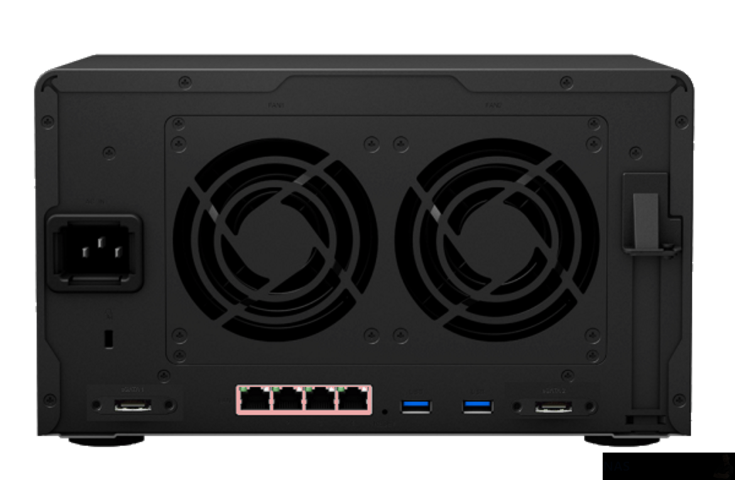
I know it is fantastically overstated, but the hardware in a NAS can change EVERYTHING. This isn’t a dull PC-builder point, I know that A+ software is ultimately what a NAS buyer should invest in, but the extent to which your Synology DS1620xs NAS and DSM 6.2/7.0 will run is largely governed by the internal hardware. Contrary to what Synology would admit, the Diskstation Manager software does not run the fullest or exact extent between devices. Perhaps the CPU is an ARM efficiency vs power processor or a beefy Intel with embedded graphics and VM support – the hardware makes all the difference and the Synology DS1620xs is no exception. It is with this in mind that we can say with a degree of certainty that the DS1620xs can do pretty much EVERYTHING in the entire Synology catalogue of applications, as well as support a huge number of other 3rd party applications. The inclusion of that Quad-Core Xeon CPU and the SSD NVMe caching bays means that internal speeds will be high. Likewise, the PCIe slot for adding 10/25/40Gbe network cards and those 4 2.5Gbe LAN ports means that you are looking at some serious external output too!
That is all that we can confirm 100% for the hardware of 2020 from Synology, and even then the HD6400 is still in the prototype stages.
Which Synology NAS Should I Buy Right Now?
The mystery and lack of concrete information of the new Synology DSx20+ series and other disk station NAS only further highlight that the choice of most NAS buyers in these closing months of the year is not an easy one. It is understandable that most buyers want to ensure that the equipment they invest in is the very best it can be and knowing that a purchase was originally released in 2017 can throw you off a bit. Add to that the simple fact that many buyers ONLY want to know the specifications of a newer unit to help them decide between new and old (such as the older DS916+ having a better CPU than the newer DS918+) only serves to complicate things further. So, If you are thinking about buying a brand new Synology NAS and are unsure if you should buy one of the existing range (maybe in a black Friday sale or something) or whether you should hold out a little longer, I recommend using subscribing here to the blog and/or messaging me via the FREE advice section below with what you need the NAS to do. Notwithstanding taht I will keep you all informed on ALL new releases, I will be able to tell you whether you are better of with an older generation unit and where to buy it.
📧 SUBSCRIBE TO OUR NEWSLETTER 🔔🔒 Join Inner Circle
Get an alert every time something gets added to this specific article!
This description contains links to Amazon. These links will take you to some of the products mentioned in today's content. As an Amazon Associate, I earn from qualifying purchases. Visit the NASCompares Deal Finder to find the best place to buy this device in your region, based on Service, Support and Reputation - Just Search for your NAS Drive in the Box Below
Need Advice on Data Storage from an Expert?
Finally, for free advice about your setup, just leave a message in the comments below here at NASCompares.com and we will get back to you. Need Help?
Where possible (and where appropriate) please provide as much information about your requirements, as then I can arrange the best answer and solution to your needs. Do not worry about your e-mail address being required, it will NOT be used in a mailing list and will NOT be used in any way other than to respond to your enquiry.
Need Help?
Where possible (and where appropriate) please provide as much information about your requirements, as then I can arrange the best answer and solution to your needs. Do not worry about your e-mail address being required, it will NOT be used in a mailing list and will NOT be used in any way other than to respond to your enquiry.

|
 |
ZimaOS is the BEST Beginner NAS OS - Watch Your Back UnRAID and TrueNAS !!!
30TB Hard Drives are TOO BIG ! (and here is why)
COMPLETE UGREEN NAS Setup Guide - 2025 EVERYTHING VERSION
$110 USB4 to 2x10Gb Adapter Review - What the WHAT?
UGREEN NAS Now has iSCSI, 2FA and Jellyfin (and more) - FINALLY!
Seagate 30TB Ironwolf and EXOS Hard Drive Review
Access content via Patreon or KO-FI


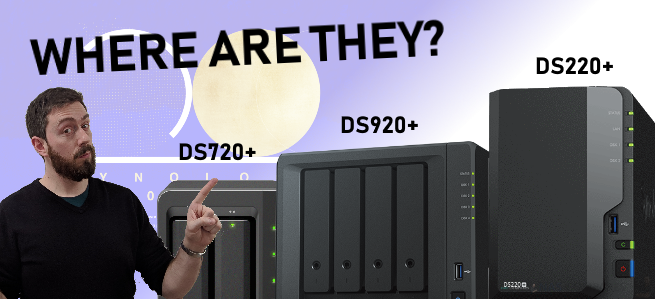
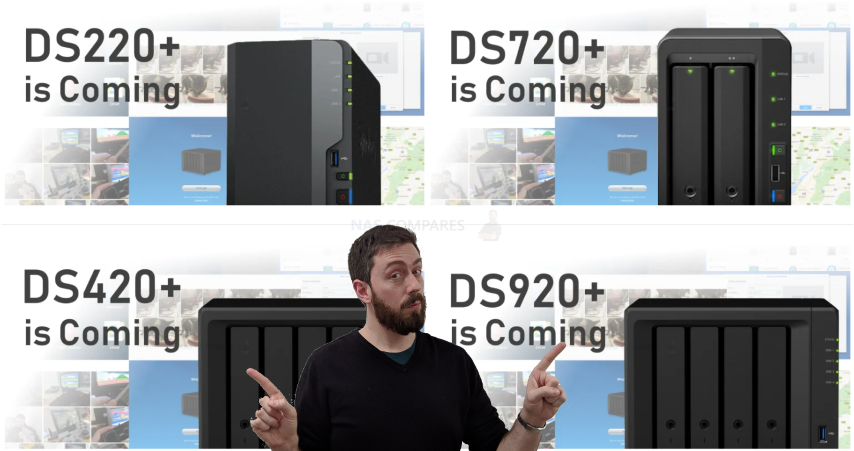

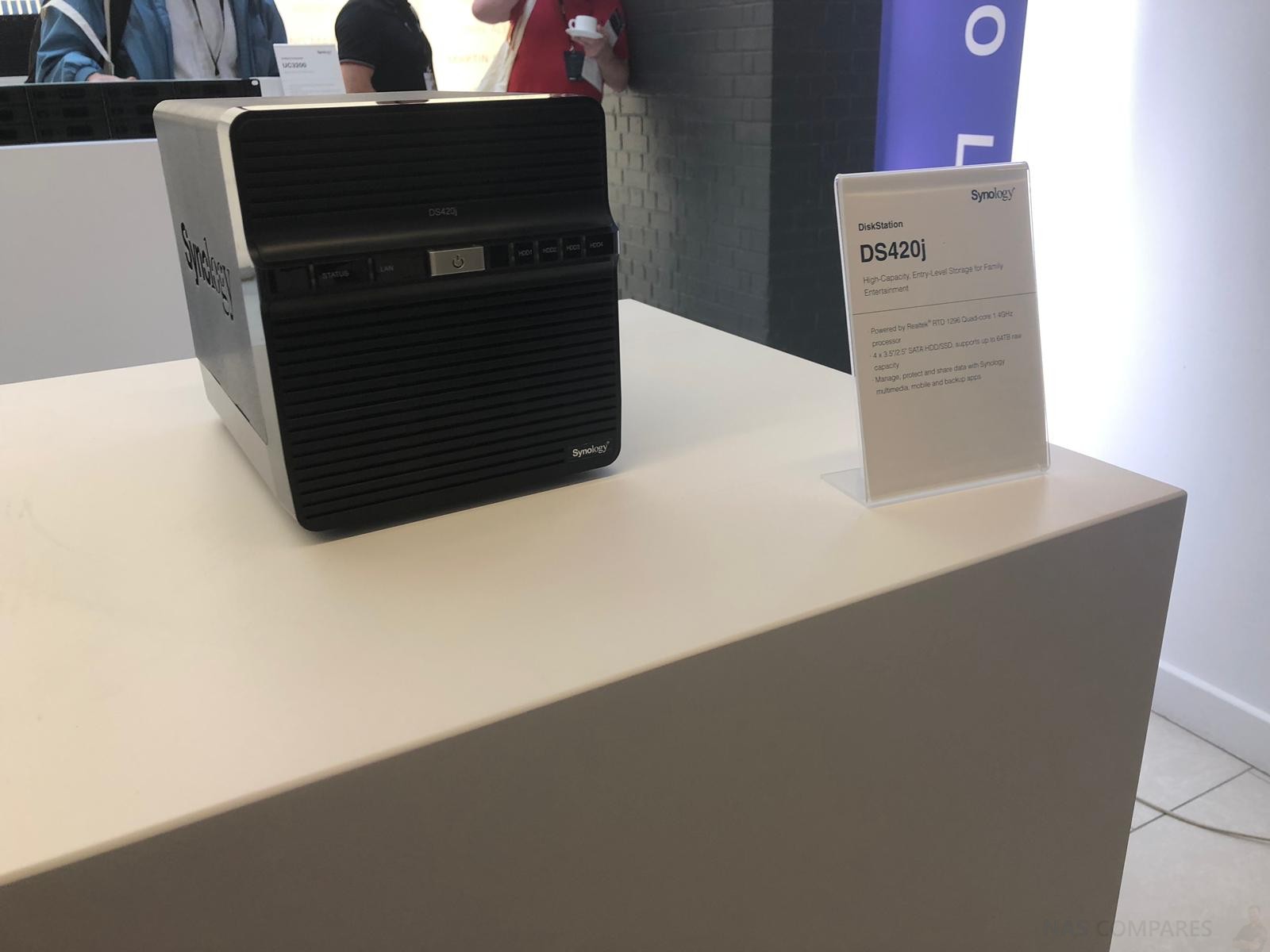



Another reason could be unrest in Taiwan during 2019 and COVID19 during end 2019-2020 ?